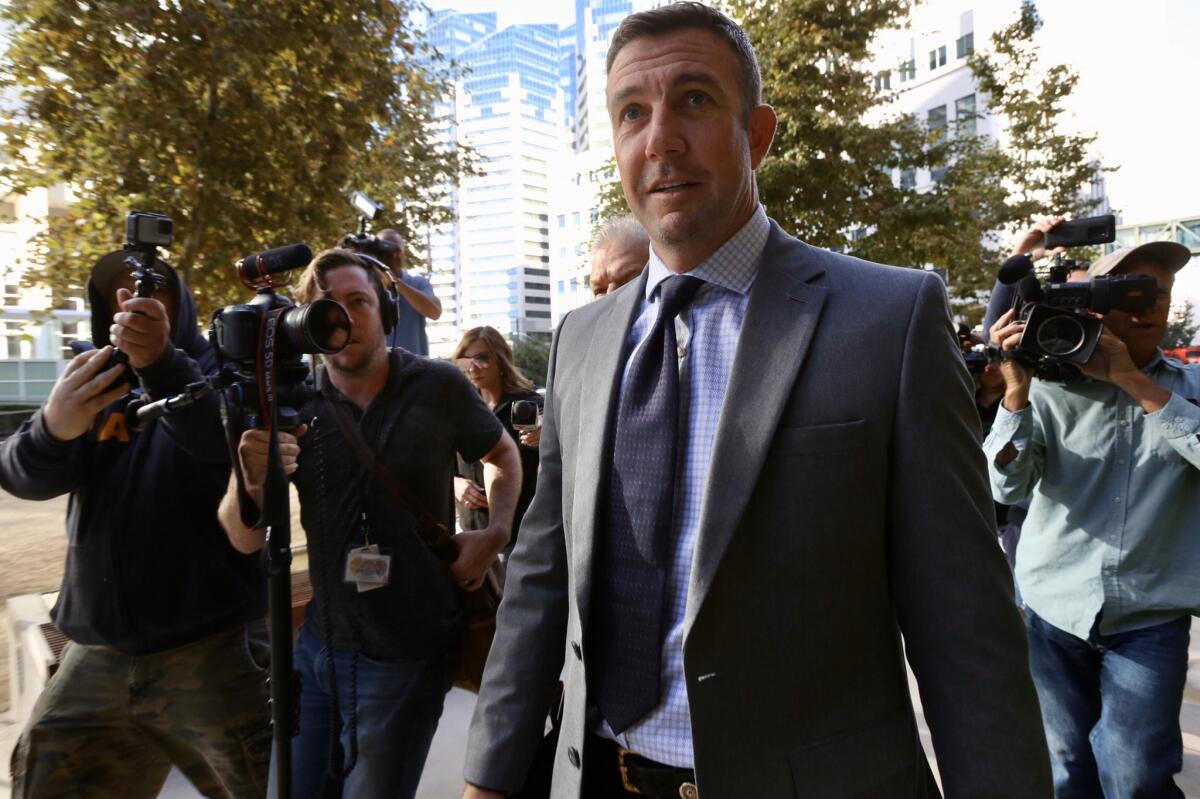Rep. Duncan Hunter’s criminal trial delayed until Jan. 22

- Share via
SAN DIEGO — A new date has been set for the criminal trial of Rep. Duncan Hunter (R-Alpine); he will now face trial starting on Jan. 22, instead of Jan. 14, based on a court decision Monday.
U.S. District Court Judge Thomas J. Whelan changed the date after lawyers requested a delay. It will allow time for the 9th U.S. Circuit Court of Appeals to consider arguments by Hunter and the government in an appeal of Whelan’s refusal in July to throw out the indictment.
Hunter’s lawyers plan to ask the appeals court to dismiss charges that he spent more than $250,000 in campaign donations on girlfriends, family vacations, tuition for his children and other personal expenses.
Whelan said Monday that he wants to get Hunter’s criminal trial done before the March 3 primary for the sake of voters and the public.
Both Duncan and Margaret Hunter pleaded not guilty to all charges when they were arraigned in August 2018. Margaret Hunter changed her plea in June to guilty of a single charge and agreed to testify against her husband. Duncan Hunter continues to fight the indictment.
Hunter’s defense attorney, Gregory Vega, filed a motion with Whelan in June arguing that some of the evidence that prosecutors gathered about Hunter’s allegedly criminal conduct was protected by the “speech or debate” clause of the U.S. Constitution. Whelan rejected the argument, ruling that it was “wholly without merit.”
The speech or debate clause generally protects members of Congress from being prosecuted for legislative actions taken in the course of their official duties.
A Court of Appeals decision last week to hear arguments in the appeal on Dec. 12 in Seattle may prompt attorneys to delay Hunter’s trial for a second time, despite the appellate court granting the government’s request to expedite the briefing schedule.
Hunter’s appellate attorney, Devin Burstein, told the court during Monday’s hearing that Hunter wanted to keep the trial date as close to the Jan. 14 start as possible, while still giving the 9th Circuit time to do its work following arguments in December.
One of the prosecutors told the court on Monday that the government believed a one-week continuance was the government’s best chance of getting the case to trial as quickly as possible.
Of the at least 10 lawmakers who have cited the speech or debate clause in their defenses against criminal charges in the last 50 years, none have gone free based on the constitutional protection, according to a recent review by the Buffalo News.
The defense has succeeded more broadly in delaying trial, sometimes for years.
If the 9th U.S. Circuit Court of Appeals rules against Hunter, he may choose to appeal further, by petitioning for a rehearing by the 9th Circuit, then appealing to the U.S. Supreme Court.
Asked Friday as he left the courthouse about his feelings on the judge’s decision to grant a short delay in the hopes of resolving the trial before the March primary, Hunter told reporters he had gotten the ruling he wanted.
Hunter also told reporters that he did not plan to be present in Seattle for arguments in his appeal in December.
Hunter declined to comment on a recent poll that showed him trailing Republican and Democrat opponents in the race for the 50th Congressional District seat.
Cook writes for the San Diego Union-Tribune.
More to Read
Sign up for Essential California
The most important California stories and recommendations in your inbox every morning.
You may occasionally receive promotional content from the Los Angeles Times.














